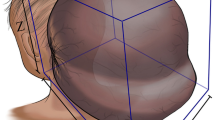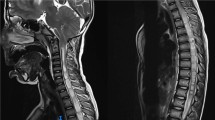Abstract
Introduction
Meckel-Gruber Syndrome (MKS) is an autosomal recessive genetic disorder, notable for its triad of occipital encephalocele, polycystic renal dysplasia, and postaxial polydactyly. Identified by Johann Friederich Meckel in 1822, MKS is categorized as a ciliopathy due to gene mutations. Diagnosis is confirmed by the presence of at least two key features. The condition is incompatible with life, leading to death in the womb or shortly after birth. Recent studies have largely focused on the genetic aspects of MKS, with limited information regarding the impact of neurosurgical approaches, particularly in treating encephaloceles.
Methods
A systematic review was performed according to the PRISMA statement. The PubMed, Embase, and Web of Science databases were consulted for data screening and extraction, which was conducted by two independent reviewers. The search strategy aimed to encompass studies documenting cases of MKS with published reports of encephalocele excisions, and the search strings for all databases were: Meckel-Gruber syndrome OR Meckel Gruber syndrome OR Meckel-gruber OR Meckel Gruber.
Results
The study included 10 newborns with MKS associated with occipital encephalocele or meningocele, all of whom underwent surgical repair of the occipital sac. The mean gestational age at birth was 36 (± 2) weeks. The mean of birth weight was 3.14 (± 0.85) kilograms. The average head circumference at birth was 33.82 cm (± 2.17). The mean diameter of the encephalocele/meningocele was 5.91 (± 1.02) cm. Other common central nervous system abnormalities included hydrocephalus, Dandy-Walker malformation, and agenesis of the corpus callosum. 40% required shunting for hydrocephalus. Surgery to remove the occipital sac occurred at a median age of 2.5 days (1.5–6.5). The most common post-surgical complication was the need for mechanical ventilation. The most common cause of death was pneumonia and the median age at death was 6.66 (0.03–18) months.
Conclusion
Our findings suggest that neurosurgical intervention, especially for managing encephaloceles, may offer some improvement in survival, albeit within a context of generally poor prognosis. However, these results should be interpreted with caution.

Similar content being viewed by others
Availability of data and materials
No datasets were generated or analysed during the current study.
References
Chen CP (2007) Meckel syndrome: genetics, perinatal findings, and differential diagnosis. Taiwan J Obstet Gynecol 46(1):9–14. https://doi.org/10.1016/S1028-4559(08)60100-X
Roy J, Pal M (2013) Meckel gruber syndrome. J Clin Diagn Res 7(9):2102–2103. https://doi.org/10.7860/JCDR/2013/5946.3421
Shetty BP, Alva N, Patil S, Shetty R (2012) Meckel-Gruber syndrome (dysencephalia splanchnocystica). J Contemp Dent Pract 13(5):713–715. Published 2012 Sep 1. https://doi.org/10.5005/jp-journals-10024-1214
Smith UM, Consugar M, Tee LJ et al (2006) The transmembrane protein meckelin (MKS3) is mutated in Meckel-Gruber syndrome and the wpk rat. Nat Genet 38(2):191–196. https://doi.org/10.1038/ng1713
Hartill V et al (2017) Meckel-Gruber syndrome: an update on diagnosis, clinical management, and research advances. Front Pediatr 5:244. https://doi.org/10.3389/fped.2017.00244
Parelkar SV, Kapadnis SP, Sanghvi BV, Joshi PB, Mundada D, Oak SN (2013) Meckel-Gruber syndrome: a rare and lethal anomaly with review of literature. J Pediatr Neurosci 8(2):154–157. https://doi.org/10.4103/1817-1745.117855
Kompanje EJ (2003) Features described and illustrated in 1684 suggesting Meckel-Gruber syndrome. Pediatr Dev Pathol 6(6):595–598. https://doi.org/10.1007/s10024-003-2020-2
Salonen R, Paavola P (1998) Meckel syndrome. J Med Genet 35:497–501. https://doi.org/10.1136/jmg.35.6.497
Seller MJ (1981) Phenotypic variation in Meckel syndrome. Clin Genet 20(1):74–77. https://doi.org/10.1111/j.1399-0004.1981.tb01811.x
Chiriac DV, Hogea LM, Bredicean AC et al (2017) A rare case of Meckel-Gruber syndrome. Rom J Morphol Embryol 58(3):1023–1027
Salonen R, Norio R (1984) The Meckel syndrome in Finland: epidemiologic and genetic aspects. Am J Med Genet 18(4):691–698. https://doi.org/10.1002/ajmg.1320180415
Alexiev BA, Lin X, Sun CC, Brenner DS (2006) Meckel-Gruber syndrome: pathologic manifestations, minimal diagnostic criteria, and differential diagnosis. Arch Pathol Lab Med 130(8):1236–1238. https://doi.org/10.5858/2006-130-1236-MS
Aydin Ozturk P, Asena M, Katar S, Ozturk U (2019) Meckel-Gruber syndrome: a case who lived for 5 months. Pediatr Neurosurg 54(4):277–280. https://doi.org/10.1159/000500766
Mittermayer C, Lee A, Brugger PC (2004) Prenatal diagnosis of the Meckel-Gruber syndrome from 11th to 20th gestational week. Ultraschall Med 25(4):275–279. https://doi.org/10.1055/s-2004-813057
Sepulveda W, Sebire NJ, Souka A, Snijders RJ, Nicolaides KH (1997) Diagnosis of the Meckel-Gruber syndrome at eleven to fourteen weeks’ gestation. Am J Obstet Gynecol 176(2):316–319. https://doi.org/10.1016/s0002-9378(97)70491-5
Ramadani HM, Nasrat HA (1992) Prenatal diagnosis of recurrent Meckel Syndrome. Int J Gynecol Obstet 39(4):327–332. https://doi.org/10.1016/0020-7292(92)90265-K
Ramírez Izcoa AE, Sánchez Sierra LE, Alvarenga Calidonio RH, Varela González D (2018) Síndrome de Meckel-Gruber en un lactante menor con sobrevida prolongada. Reporte de Caso. Acta Pediátrica de México 1(1):33. https://doi.org/10.18233/APM1No1pp33-411538
Gazioğlu N, Vural M, Seçkin MS et al (1998) Meckel-Gruber syndrome. Childs Nerv Syst 14(3):142–145. https://doi.org/10.1007/s003810050198
Walsh M, Graupman P (2006) Meckel-Gruber syndrome in association with an occipital meningocele. Pediatr Neurosurg 42(5):333–334. https://doi.org/10.1159/000094074
Kaplan M, Ben-Neriah Z, Achiron R (1993) Survival in an infant with a prenatally diagnosed Meckel syndrome variant. Am J Perinatol 10(2):172–174. https://doi.org/10.1055/s-2007-994654
Paavola P, Salonen R, Baumer A et al (1997) Clinical and genetic heterogeneity in Meckel syndrome. Hum Genet 101(1):88–92. https://doi.org/10.1007/s004390050592
Sundus-Uygun S et al (2017) Meckel Gruber syndrome: a case report with review of literature. Eur J Gen Med 14(4):108–110. https://doi.org/10.29333/ejgm/81741
Schurig V, Bowen P, Harley F, Schiff D, Opitz JM (1980) The meckel syndrome in the Hutterites. Am J Med Genet 5(4):373–381. https://doi.org/10.1002/ajmg.1320050408
Copp AJ, Stanier P, DE Greene N (2013) Neural tube defects: recent advances, unsolved questions, and controversies. Lancet Neurol 12(8):799–810. https://doi.org/10.1016/S1474-4422(13)70110-8
Protzenko T, dos Santos Gomes Junior SC, Bellas A, Salomão JFM, (2021) Hydrocephalus and occipital encephaloceles: presentation of a series and review of the literature. Child’s Nervs System 37(11):3437–3445. https://doi.org/10.1007/s00381-021-05312-7
Velho V, Naik H, Survashe P et al (2019) Management strategies of cranial encephaloceles: a neurosurgical challenge. Asian J Neurosurg. 14(03):718–724. https://doi.org/10.4103/ajns.AJNS_139_17Barisic . Boban I, Loane LM et al (2015) Meckel–Gruber Syndrome: a population-based study on prevalence, prenatal diagnosis, clinical features, and survival in Europe. Eur J Hum Genet 23(6):746–752. https://doi.org/10.1038/ejhg.2014.174
Weichert J, Hoellen F, Krapp M et al (2017) Fetal cephaloceles: prenatal diagnosis and course of pregnancy in 65 consecutive cases. Arch Gynecol Obstet 296(3):455–463. https://doi.org/10.1007/s00404-017-4424-7
Barisic I, Boban L, Loane M et al (2015) Meckel-Gruber Syndrome: a population-based study on prevalence, prenatal diagnosis, clinical features, and survival in Europe. Eur J Hum Genet 23(6):746–752. https://doi.org/10.1038/ejhg.2014.174
Akyol ME, Çelegen I, Basar I, Arabacı O (2022) Hydrocephalus in encephalocele. Eur Rev Med Pharmacol Sci 26(15):5399–5405. https://doi.org/10.26355/eurrev_202208_29407
Naik V et al (2019) Giant Encephalocoele: a rare case report and review of literature. Asian J Neurosurg 14(1):289–291. https://doi.org/10.4103/ajns.AJNS_87_18
Ghritlaharey RK (2018) A brief review of giant occipital encephalocele. J Neurosci Rural Pract 9(4):455–456. https://doi.org/10.4103/jnrp.jnrp_189_18
Markovic I, Bosnjakovic P, Milenkovic Z (2020) Occipital encephalocele: cause, incidence, neuroimaging and surgical management. Curr Pediatr Rev 16(3):200–205. https://doi.org/10.2174/1573396315666191018161535
Alberts A, Lucke-Wold B (2023) Craniofacial encephalocele: updates on management. J Integr Neurosci 22(3):79. https://doi.org/10.31083/j.jin2203079
Kumar V, Kulwant SB, Saurabh S, Richa SC (2017) Giant occipital meningoencephalocele in a neonate: a therapeutic challenge. J Pediatr Neurosci 12(1):46–48. https://doi.org/10.4103/1817-1745.205655
Yindeedej V, Sungpapan R, Duangprasert G, Noiphithak R (2023) The outcome of surgical management for the patient with giant occipital encephalocele: a case illustration and systematic review. Childs Nerv Syst 39(8):2161–2167. https://doi.org/10.1007/s00381-023-05934-z
Salonen R, Opitz JM, Reynolds JF (1984) The Meckel syndrome: clinicopathological findings in 67 patients. Am J Med Genet 18(4):671–689. https://doi.org/10.1002/ajmg.1320180414
Author information
Authors and Affiliations
Contributions
Silvio Porto Junior (Porto Junior, S.) and Leonardo de Almeida Leão (Leão, L.A) from the Bahiana School of Medicine and Public Health spearheaded the study’s design, data analysis, and manuscript drafting. Jefferson Heber Marques Fontes Junior (Fontes, J. H. M. Jr.) from the Metropolitan Union of Education and Culture, and Hugo Nunes Pustilnik (Pustilnik, H. N.) from the University of Salvador significantly contributed to the methodology, data collection, and critical revision of the manuscript. Fontes J.H.M Jr contributed to the writing of the discussion. Matheus Gomes da Silva da Paz (Da Paz, M. G. S.), Taiane Araujo Brito (Brito, T. A.), Tancredo Alcântara Ferreira Junior (Alcantara, T.), Fernanda Oliveira Gonçalves de Deus and Leonardo Miranda de Avellar (De Avellar, L. M.) from the General Hospital Roberto Santos were instrumental in data acquisition, analysis, and provided substantial input in drafting and reviewing the manuscript, ensuring its intellectual rigor. Jules Carlos Dourado (Dourado, J.C), from the General Hospital Roberto Santos, contributed to the intellectual rigor of the article review.
Corresponding author
Ethics declarations
Conflict of interest
The authors declare no conflict of interest.
Additional information
Publisher's Note
Springer Nature remains neutral with regard to jurisdictional claims in published maps and institutional affiliations.
Rights and permissions
Springer Nature or its licensor (e.g. a society or other partner) holds exclusive rights to this article under a publishing agreement with the author(s) or other rightsholder(s); author self-archiving of the accepted manuscript version of this article is solely governed by the terms of such publishing agreement and applicable law.
About this article
Cite this article
Junior, J.H.M.F., Junior, S.P., Pustilnik, H.N. et al. Neurosurgical intervention for the Meckel-Gruber Syndrome: A systematic review. Childs Nerv Syst (2024). https://doi.org/10.1007/s00381-024-06346-3
Received:
Accepted:
Published:
DOI: https://doi.org/10.1007/s00381-024-06346-3




